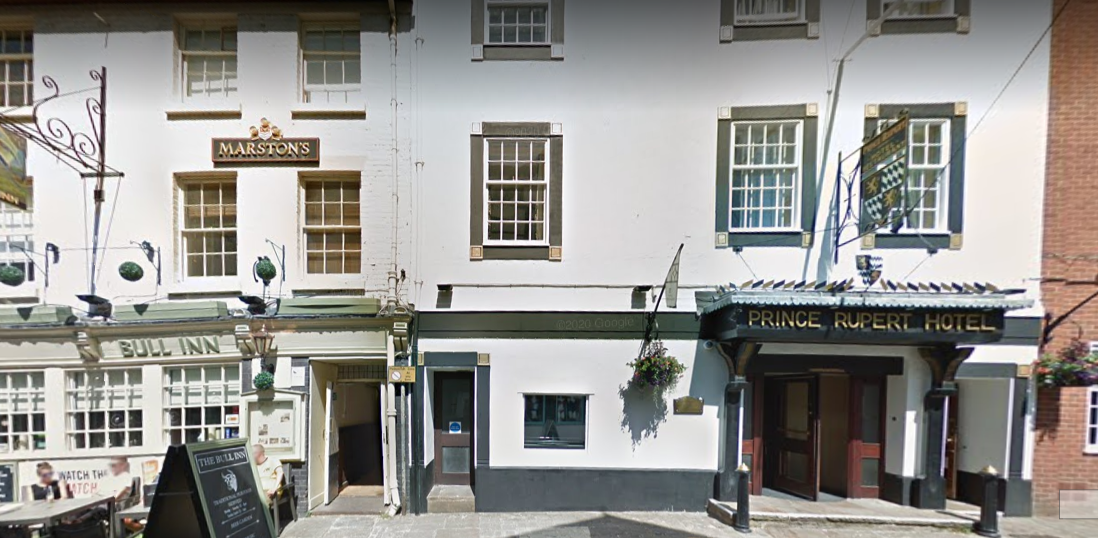“We gave them hope, but they gave us much more,” Mike Mathews owner of the Prince Rupert Hotel.
This book begins with Mike Mathews, owner of the Prince Rupert Hotel, contemplated lockdown while Boris Johnson continued as nothing was happening in the world. He saw the writing on the wall as the Covid-19 ravaged Italy. Expecting the Shrewsbury events that drew people to his historic hotel would be cancelled, he spent the next day trying to find a use for his hotel. But there were no takers and the future of the hotel looked bleak.
Boris Johnson’s held his first live news conference. His message was avoid social contact and don’t go to pubs and restaurants. The country, and the world, began to shut down. Hotel guests began to cancel bookings everywhere.
As the outlook seemed bleak, Tim Compton, Shropshire Council’s rough sleeper officer rang. The government had ordered that councils must get all rough sleepers by the weekend (Everyone In). Could the council use the Prince Rupert?
The Prince Rupert Hotel for the Homeless is an inspirational book about people facing new challenges in their professional lives. About rough sleepers struggling to accommodate the help they were offered.
Tim Compton, who had previously run the Shrewsbury Ark drop in centre, made it clear that it would not be easy giving a home to homeless people who were unused to living inside, might have drug habits, alcoholism and could be suicidal. Some had been on the streets for decades. Tim did not expect to succeed in his urgent request given the luxury of the hotel, parts of which date back to the twelfth century. Despite that, Mike and key hotel staff agreed.
This was not the only example of such help across Shropshire. Many pubs and hotels housed health and care staff who had been brought in to replace staff in isolation. Alexandra House care home in Ludlow locked its doors and those staff that were able to live in until vaccinations were available and the pandemic eased. One hotelier provided a room in Ludlow at my request for a homeless man who obeyed no rules and eventually had to be ejected. There were hundreds of other examples of proprietors and people stepping forward across the county and country.
But the story of the Prince Rupert is perhaps unique, not just because of the support given to Shrewsbury’s rough sleepers but also for the sympathetic support given to people who had fallen out of society.
There was a clash with the furlough scheme. Some hotels across the country closing once their staff decided that 80% pay for being at home was sufficient reward. The Lion, another historic hotel in Shrewsbury, closed ejecting its residents. But the manager and two key staff at the Prince Rupert remained put. Not everyone could cope. The chef quit apparently over a dispute about his use pickled onions in a cottage pie.
They had a steep learning curve. While other hotels were throwing out their homeless guests if they broke the rules, the Prince Rupert developed a regime of Care Consideration and Respect (CCR).
Mike and his staff faced residents high on drugs. Low on withdrawals. Police calls. Arrests. Alcoholics and drug addicts who didn’t get on. Addicts with drug debts. Drunks who wet themselves. Baths overflowing while drug users were out of it. Filthy rooms. Cigarette butts crushed into the carpet. Needles.
They learnt about the best doors for pitching. How dogs encourage people to give more money. The hierarchy of rough sleepers and control of pitches for sleeping and begging. The struggles, violence and and tragedies that led to drug use, alcohol and eventually homelessness.
This is far from a bleak story. There were cream teas. Easter eggs donated by local businesses that had learnt of the project. The Prince Rupert gained local and national media coverage for what was an extraordinary and valiant venture during the pandemic. Donations of money and clothes flowed in.
People beyond society were brought in from the cold, some permanently. When Everyone In ended, many residents obtained accommodation and jobs, having been boosted by being cared about, for some for the first time in their lives.
Everyone In took 37,000 people off the streets, 26,000 of whom were given long-term housing. Research by UCL showed the scheme saved lives and reduced hospital admissions. Everyone In was nationally funded, but it was efforts of local councils, people like Tim Compton and his colleagues, and especially people like Mike Matthews, Charlie Green and Jacki Law at the Prince Rupert that made it work.
Christina Lamb, who is the Sunday Times chief foreign correspondent, initially wrote a feature article about the Prince Rupert’s radical hospitality. She then joined its lockdown bubble. Her book is a unique personal perspective on the personal lives of some of the most isolated people in our community. It is a work of informal anthropology and a unique insight into the struggles of the homeless and those who struggle to help them.
The Prince Rupert Hotel for the Homeless: A True Story of Love and Compassion Amid a Pandemic. Christina Lamb. HarperCollins Publishers Limited. Published 9 July 2022. Also available on Audible.

